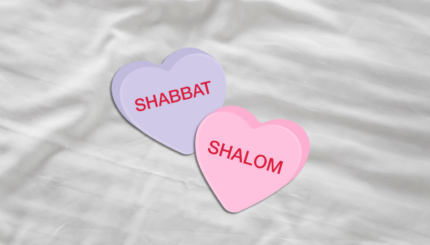In the times of the ancient Israelites, we were supposed to make sacrifices to God on many different occasions. When we sinned, we made sacrifices. When we celebrated, we made sacrifices. And at all other times, just living our lives, we made sacrifices in order to get closer to God.
A lot of us here are familiar with sacrifices, but not the same kind that are discussed in this week’s Torah portion, which consists of the opening chapters of the book of Leviticus. I was lucky when I came out, because much of my family and community was accepting. Over the past three years I’ve also been lucky to know many in the Keshet community and hear their stories. So many of them have sacrificed so much just to be who they are and to come to Keshet.
Sometimes, it can be hard to differentiate what we’re making sacrifices for. The big two reasons discussed in this week’s Torah portion are sin and celebration. Speaking for myself, when I first realized that I was gay, it felt like it was a sin. I know a lot of others have felt this way too. In keeping this a secret, many of us have sacrificed our own happiness and mental health, and some of our LGBTQ family have felt the need to sacrifice their lives. But this isn’t the only way to live.
When I first came out, most people around me recognized it as something to be celebrated. But coming out wasn’t without sacrifice. There were some people who didn’t want to be a part of my life anymore. These people—my friends, family, teachers, and others—were my sacrifice. It was not my sacrifice to God, but rather to myself. I was done giving up my happiness in order to appease others.
It took me longer than I’m proud of to realize that my purpose in life wasn’t just to make others happy, to get along, and not rock the boat. As Dr. Seuss said, “why fit in when you were born to stand out?” We don’t have to keep sacrificing our own happiness to keep others comfortable.
To me, my sacrifice was worth it. My sacrifice in coming out, and my sacrifice in putting myself out there to advocate for gender-neutral bathrooms in my school, these were all worth it because I was able to make things easier for those to come after me. If another one of my cousins is LGBTQ, they will have me as a role model, and my family will be more understanding than they were when I came out. If there are kids at my school who don’t feel comfortable using the binary gender bathrooms, they won’t have to stick their neck out in order to feel safe in their own school. They won’t have to feel the sting of classmates, teachers, and administrators who are against them from the start.
My school counselor likes to say that the . These arrows are my sacrifice, but I don’t see it as a sacrifice for my sins. I see it as a sacrifice in celebration of who I am, of who we are as Keshet and as Jewish queer youth. So to those of you who are sacrificing your happiness for the sake of others, let me tell you that sacrificing in celebration of who you are and how you want the world to be is so much more fulfilling. Do what you need to do to keep yourselves safe, because that comes first. Thank you all for the sacrifices that you’ve made in order to be here today, and know above all else that these sacrifices have not been in vain.
Like this post?
- Join the conversation through MyJewishLearning’s weekly blogs newsletter.
- Get breaking LGBTQ Jewish news, resources and inspiration from Keshet in your inbox!
- Looking for a supportive community for LGBTQ Jewish youth? Check out Keshet’s resources for teens.
Torah
Pronunced: TORE-uh, Origin: Hebrew, the Five Books of Moses.


